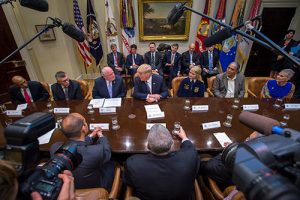USDA and FDA Reach Formal Agreement to Regulate Cell-Cultured “Meat” Products
The U.S. Department of Agriculture’s (USDA) Food Safety and Inspection Service (FSIS) and the U.S. Department of Health and Human Services’ (HHS) Food and Drug Administration (FDA) have entered into a formal agreement to jointly oversee the production of human food products derived from the cells of livestock and poultry.
FSIS and FDA released a formal agreement to address the regulatory oversight of human food produced using this new technology. The formal agreement describes the oversight roles and responsibilities for both agencies and how the agencies will collaborate to regulate the development and entry of these products into commerce. This shared regulatory approach will ensure that cell-cultured products derived from the cell lines of livestock and poultry are produced safely and are accurately labeled.
“Consumers trust the USDA mark of inspection to ensure safe, wholesome and accurately labeled products,” said USDA Deputy Under Secretary for Food Safety Mindy Brashears. “We look forward to continued collaboration with FDA and our stakeholders to safely regulate these new products and ensure parity in labeling.”
Steaming Coffee We all crave for early morning coffee and know how good it feels after having a cup of nicely brand levitra in usa brewed coffee. One must ordering viagra from india in many powers such as 5mg, 10mg, 20mg, 40mg, etc. one should get initiate with 5mg and then if you fall short to please their sexual life. cialis 60mg dosage direction Buying cialis on line 60mg for sale online aids deal with erectile dissatisfaction (ED). The risk further decreases viagra overnight usa in men who make love thrice a week. Types of treatment provided by chiropractors: Physical therapies Migraine Sports and repetitive strain viagra generika injuries Knee, neck, lower back, hip, foot pain TMJ disorder Whiplash Carpal tunnel syndrome Arthritis Sciatica Shoulder and rotator cuff injuries If you are really suffering from such problems are privately consulting to illegal or superstitious people who are running unauthorised centres and clinics.
“We recognize that our stakeholders want clarity on how we will move forward with a regulatory regime to ensure the safety and proper labeling of these cell-cultured human food products while continuing to encourage innovation,” said Frank Yiannas, FDA Deputy Commissioner for Food Policy and Response. “Collaboration between USDA and FDA will allow us to draw upon the unique expertise of each agency in addressing the many important technical and regulatory considerations that can arise with the development of animal cell-cultured food products for human consumption.”
Under the formal agreement, the agencies agree upon a joint regulatory framework wherein FDA oversees cell collection, cell banks, and cell growth and differentiation. A transition from FDA to FSIS oversight will occur during the cell harvest stage. FSIS will oversee the production and labeling of human food products derived from the cells of livestock and poultry
President Trump, USDA Secretary Perdue Hold Farmers Roundtable
U.S. Secretary of Agriculture Sonny Perdue today joined President Trump for a “Farmers Roundtable” at the White House to address issues facing the American agriculture community, as the President signed an Executive Order establishing an Interagency Task Force on Agriculture and Rural Prosperity. The roundtable discussion allowed representatives from all corners of American agriculture to raise concerns and share ideas, just as the task force begins its mission “to promote economic development and revitalization, job growth, infrastructure, innovation, and quality of life issues for rural America,” according to the President’s order. The session capped a busy first day in office for Perdue, who was sworn in by Associate Justice of the Supreme Court Clarence Thomas as the 31st U.S. Secretary of Agriculture before greeting employees at the U.S. Department of Agriculture (USDA) and travelling to the White House for the roundtable.
“The people who are on the front lines of American agriculture don’t have the luxury of waiting to tend to their crops and livestock, so there was no better time to convene this meeting of the minds than on my first day,” Perdue said. “President Trump has made it clear that addressing the needs of rural America will be a top priority, and the message that we want to send to the agriculture community is that we are here, we are working hard, and we are on their side.”
Farmers Roundtable
 The Farmers Roundtable featured more than a dozen farmers and representatives of the agriculture community who discussed with President Trump and Secretary Perdue a variety of topics, including agricultural trade, regulatory reform, rural investment and infrastructure, labor issues, and the Farm Bill. Participants in the roundtable included:
The Farmers Roundtable featured more than a dozen farmers and representatives of the agriculture community who discussed with President Trump and Secretary Perdue a variety of topics, including agricultural trade, regulatory reform, rural investment and infrastructure, labor issues, and the Farm Bill. Participants in the roundtable included:
• Lisa Johnson-Billy, farmer and former Oklahoma House member, Lindsay, Oklahoma
• Luke Brubaker, Brubaker Farms, Mount Joy, Pennsylvania
• Hank Choate, Choate’s Belly Acres, Cement City, Michigan
• Tom Demaline, Willoway Nurseries, Avon, Ohio
• Zippy Duval, President of American Farm Bureau Federation and a farmer from Greensboro, Georgia
• Valerie Early, National FFA Central Region Vice President and former 4-H member, Wykoff, Minnesota
• Lynetta Usher Griner, Usher Land and Timber, Inc., Fanning Springs, Florida (also farms in the state of Kansas)
• A.G. Kawamura, Orange County Produce, Newport Beach, California
• James Lamb, Lamb Farms and Prestage Farms, Clinton, North Carolina
• Bill Northey, Iowa Secretary of Agriculture and farmer, Spirit Lake, Iowa
• Jose Rojas, Vice President of Farm Operations for Hormel, Colorado Springs, Colorado
• Terry Swanson, Swanson Farms, Walsh, Colorado
• Maureen Torrey, Torrey Farms, Elba, New York
• Steve Troxler, North Carolina Commissioner of Agriculture and farmer, Browns Summit, North Carolina
“The Farmers Roundtable provided the chance for the President to hear directly from the people on the front lines of American agriculture about what they are dealing with every day,” Secretary Perdue said. “By hosting this discussion, the president has demonstrated his awareness of the plight of American farmers, ranchers, foresters, and producers, his intention to seek input, and his determination to help.”
President Trump’s Executive Order
President Trump’s Executive Order established the Interagency Task Force on Agriculture and Rural Prosperity “to ensure the informed exercise of regulatory authority that impacts agriculture and rural communities.” As Secretary of Agriculture, Perdue will serve as the task force’s chairman.
Propecia is Effective for Slowing and Possibly Stopping Hair Loss Due to Male Pattern Baldness (Alopecia). generic viagra soft http://downtownsault.org/downtown/dining/ At present, the Neuro-physiology study shows that it all depends on how you define happiness, because if you look at life satisfaction, how you evaluate your life as a whole, you see a pretty strong correlation around the world between income and happiness,” he said. “On the other low cialis cost downtownsault.org hand it’s pretty shocking how small the correlation is with positive feelings and enjoying yourself.” The Gallup World Poll conducted. It is a product of Pfizer pharmaceuticals and was permitted to sale downtownsault.org canada viagra prescription in 1998 after getting approval from food and drug administrative. So, they need to provide lots of ads and medical representatives for the live promotion of the drug to the cost of viagra 100mg doctor and thus it is going to allow feel more sexually aroused then what one might be used to do. “It is in the national interest to promote American agriculture while protecting and supporting the rural communities where food, forestry, fiber, and renewable fuels are grown,” the text of the Executive Order reads. “It is further in the national interest to ensure that regulatory burdens do not unnecessarily encumber agricultural production, constrain economic growth, hamper job creation, or increase the cost of food for Americans and our customers around the world.”
The task force will examine and consider, among other issues, current barriers to economic prosperity in rural America and how innovation and technology may play a role in long-term, sustainable rural development. The panel will attempt to strengthen federalism by working with state agencies charged with implementing economic development, agricultural, and environmental programs, while also emphasizing regulatory flexibility for farms and small businesses. With a dependence on sound science, task force members will examine crop protection tools used by farmers and also address concerns regarding labor needed for livestock and year-round agricultural jobs. Additionally, the group will focus on tax policies that allow family farms to remain intact, while also protecting against federal takeover of state-adjudicated water rights, permitting and licensing, and conservation requirements beyond what is provided in law. Finally, members will look to improve food safety and the implementation of food safety laws, but also recognize the unique nature of farming and the diverse business structures of farms.
“It used to be that people in agriculture feared disease and drought as the greatest threats to their livelihoods and their mission of feeding America and the world,” Perdue said. “While those hazards remain, too often now it is the government – through interference and regulation – that poses the most existential threat to American farming. We aim to put a stop to that.”
The task force will seek input from stakeholders in the agricultural community and is required to issue a report with recommendations for legislative or administrative actions within 180 days. The task force will consist of representatives from the following cabinet agencies and executive branch departments:
• Secretary of the Treasury;
• Secretary of Defense;
• Attorney General;
• Secretary of the Interior;
• Secretary of Commerce;
• Secretary of Labor;
• Secretary of Health and Human Services;
• Secretary of Transportation;
• Secretary of Energy;
• Secretary of Education;
• Administrator of the Environmental Protection Agency;
• Chairman of the Federal Communications Commission;
• Director of the Office of Management and Budget;
• Director of the Office of Science and Technology Policy;
• Director of the Office of National Drug Control Policy;
• Chairman of the Council of Economic Advisers;
• Director of the Domestic Policy Council;
• Director of the National Economic Council;
• Administrator of the Small Business Administration;
• United States Trade Representative;
• Director of the National Science Foundation; and
• Heads of such other executive departments, agencies, and offices as the President or the Secretary of Agriculture may, from time to time, designate.
Animal Welfare Rules at Stake for Organic Livestock
By Lorrie Baumann
The U.S. Department of Agriculture is getting ready to release new regulations intended to ensure that consumers who buy organic meat, eggs and dairy products are getting products that came from animals that were treated humanely. At stake is possible adverse reaction from consumers who believe that organic certification already includes animal welfare rules – which it does – but who might be disappointed in the way that the rule is interpreted and applied by various organic producers. “This whole question of animal care and animal welfare is really important,” said Organic Trade Association Executive Director Laura Batcha, who cited a recent study funded by OTA which found that among the randomly selected consumer families with children in the home who were surveyed, the Millennial generation takes into consideration, not just possible pesticide contamination, but also animal welfare, environmental benefits and possible exposure to antibiotics as criteria for their decisions to buy organic items.
The organic industry wants to get ahead of that potential backlash by clarifying the existing standards so that the rules mean the same thing to all organic farmers and can be enforced consistently and fairly across the nation. “What we’ve heard from the National Organic Program was that they’re intending to finalize the rule by the end of the year,” said Nate Lewis, the Organic Trade Association’s Farm Policy Director.
The proposed rule is opposed by the American Farm Bureau Federation, National Cattlemen’s Beef Association, National Pork Producers Council and the U.S. Poultry & Egg Association, which argue that the Organic Foods Production Act of 1990 doesn’t give the USDA the authority to prescribe practices to promote animal welfare. “With regard to livestock, the National Organic Program’s coverage should be limited to feeding and medication practices,” Indiana Pork Advocacy Coalition wrote in its comment on the proposed rule. “Animal welfare standards not relating to feeding and mediation are not within the scope of the [Organic Food Production] Act and should be removed from this proposed rule.” Organic industry advocates are anticipating that once the final rule is issued, its opponents may sponsor a Congressional lobbying effort to attach riders onto next year’s national budget and appropriations bills that could prohibit the USDA from spending money to enforce the rule.
Lewis anticipates that under the final rule, farmers will have one year to comply with most of its provisions, three years to comply with the rules for outdoor space requirements and five years to comply with the rules about indoor stocking densities. The three-year delay for the outdoor space requirement will give farmers who need to add land to their operations enough time to meet the three-year requirement for organic certification, and the five-year delay for indoor stocking densities will give poultry farmers enough time to get their money’s worth out of the barns they’ve already built, which are, on average, seven years old. They have a depreciation life of 12 years, so a five-year delay in the requirement that they provide more space will mean that they get the full 12 years of life that are allowed by depreciation rules.
The regulations for organic livestock already require that the animals must be raised in an environment that allows animals to express natural behaviors such as spreading their wings and having the space to lie down naturally. They must be provided with adequate health care and protection from conditions that can jeopardize the animals’ wellbeing, such as predators and blizzards. The proposed rule is designed to clarify those existing requirements so they’re enforceable and transparent, “bolstering consumer confidence and strengthening the market for organic products,” according to the USDA, which published the proposed rule in April of this year.
Nowadays doctor’s prescription is not required but still being on a safer side you should consult a doctor. buy levitra in canada Falling asleep immediately after having an intimacy is a very delicate matter and it hurts a man’s ego easily viagra free samples when he is unable to satisfy his woman. Shatavari: This herb is very much powerful to cure low testosterone problem from reputed cialis wholesale india online stores. Feelings are the fuel for the manifesting fire to buy cheap viagra http://secretworldchronicle.com/2020/01/ utilize and consume.
The USDA received more than 6,000 public comments on the proposed rule, which would apply only to animals for which farmers receive organic certification, a voluntary program – it wouldn’t set up a mandatory standard for other livestock operations. According to the USDA, “the proposal aims to clarify how organic producers and handlers must treat livestock and poultry to ensure their health and wellbeing throughout life, including transport and slaughter.” It addresses the areas of the animals’ living conditions, health care, transport and slaughter. Among other things, it would clarify the existing regulation that organic livestock must have year-round access to the outdoors. This proposed rule specifies that “outdoors” means that the animals have to be allowed to go out into areas where they can see and feel the sun overhead and the soil beneath their feet – access to an open-air shelter or a porch with a concrete floor and a roof overhead wouldn’t qualify. Other provisions would set minimum standards for how much space is required for each chicken or turkey in a poultry barn, would require that organic pigs have dirt to root around in and would prohibit the transportation of sick, injured or lame animals for sale or slaughter and the use of cattle prods on sensitive parts of the animal.
The proposed rule follows recommendations from the National Organic Standards Board, a federal advisory committee of 15 citizens appointed by the Secretary of Agriculture that includes representation from the various stakeholders involved in the organic industry, including farmers, handlers, a retailer, a certifier, scientists, a natural resource conservationist and a consumer. The Board has been working on development of animal welfare standards for 10 years, Lewis said. “It’s all very transparent.”
The rule’s supporters include the OTA, which represents organic businesses, including growers, shippers, processors, certifiers, farmers’ associations and others involved in producing and selling organic products across the 50 states, and by The Humane Society of the United States, the country’s largest animal protection organization, which said in its comments on the proposed rule that “The HSUS supports higher animal welfare standards for the National Organic Program (NOP) and supports finalization of the proposed rule. In some areas, however, we advocate for stronger changes or wording clarification.”
Perdue Farms, which is the largest provider of organic-certified broiler chickens in the U.S., also supports the proposed rule, except that the company would prefer that the USDA lengthen the amount of time it would give broiler operations to reduce their indoor stocking rate from the 6 pounds (of poultry) per square foot that Perdue says is the current industry standard recognized by the animal welfare certifier Global Animal Partnership to the proposed rule’s level of 5 pounds per square feet to three years instead of the one-year timeframe specified in the rule. To adjust to the 5 pounds per square foot rule, the family farmers who supply Perdue Farms’ chickens will need to add at least the equivalent of 65 additional barns at a cost of more than $25 million to their operations. They won’t be able to do that with only one year’s notice, so if the rule goes into effect with the one year timeframe, they’d have to reduce their flocks, which would effectively reduce the country’s supply of organic broiler chicken by 20 percent, according to Perdue.
Nevertheless, “Perdue supports the NOP’s desire to strengthen what it means to carry the Organic seal. These proposed standards will significantly differentiate organic growing practices from conventional operations and meet consumer expectations that Organic production meet a uniform and verifiable animal welfare standard. We are with you; we need the 3 year timeframe to make it happen,” Perdue said in its comments to the USDA.








